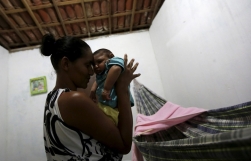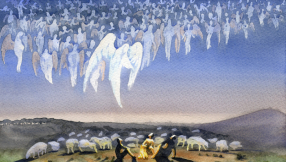Governments have been using various tools to fight the spread of the Zika virus in Latin America: fumigation, spraying of insecticides and even a plan to distribute mosquito repellents to athletes during the upcoming Summer Olympic Games in Rio de Janeiro, Brazil.
Some Christian aid workers, however, are exploring an all-natural way to prevent this public health emergency from further escalating, and they are using something fishy, literally.
Aid workers from the non-profit humanitarian organisation Operation Blessing, which is affiliated with the Christian Broadcasting Network, are distributing the indigenous Sambo fish to residents in Latin America at risk of the Zika virus infection.
This fish, native to El Salvador, is known for feeding on mosquitoes—the same insects that transmit the virus said to be causing physical deformities to babies.
Operation Blessing International President Bill Horan was the one who came up with this unique solution to the Zika virus threat. The same fish was also used to fight mosquito-related diseases in the aftermath of Hurricane Katrina, which devastated New Orleans.
"We are using them, we're distributing them, and we are helping a woman who is raising them down there. But in Mexico now we have the okay right from the cabinet level of the Mexican government to use Gambuja that are found locally in Mexico to eat mosquito larvae," Horan explained, as quoted by CBN.com.
Horan added that some techniques currently being employed to prevent the spread of the Zika virus, such as the use of mosquito bed nets, do not do much to contain these disease-carrying insects.
"Mosquito bed nets are not as effective as they were for most because the Aedes Aegypti sleeps at night. They don't bite often at night. These mosquitoes are especially active right at dawn for about two hours and just before dark for about two hours," he said.
Horan even met with First Lady Ana Hernandez of Honduras to get her support on the mosquito-eating fish project in her nation.
"We're doing a great service, we're saving lives," the group's leader said. "We're eliminating suffering and we're going after this disease at its source, but wherever Zika goes, Operation Blessing is going to go also."
Operation Blessing's Tony Cece said residents in Latin America have begun using the Sambo fish in their homes, because it is all-natural and very hassle-free.
"They're putting the fish in their sinks and into containers like this. Now this one is being used to store the Sambo fish, but in homes they use it to store water," Cece also told CBN.com
"And one of the problems is these are the breeding grounds for the Aedis Aegypti larvae, which are the mosquitoes that carry the viruses like Chicken Gunyan, dengue, and now Zika," he continued.

















